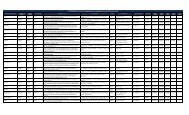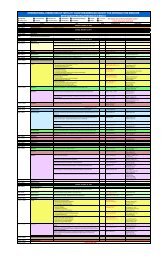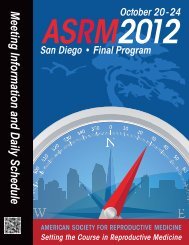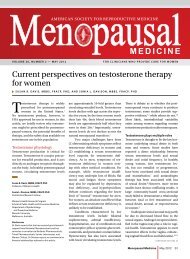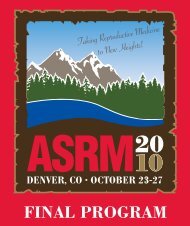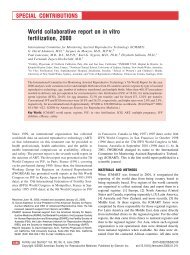scientific program • symposia - American Society for Reproductive ...
scientific program • symposia - American Society for Reproductive ...
scientific program • symposia - American Society for Reproductive ...
You also want an ePaper? Increase the reach of your titles
YUMPU automatically turns print PDFs into web optimized ePapers that Google loves.
SCIENTIFIC PROGRAM <strong>•</strong> SYMPOSIA<br />
Monday, October 17, 2011 11:15 am – 1:00 pm<br />
<strong>Society</strong> of <strong>Reproductive</strong> Surgeons Live Telesurgery<br />
SINGLE-PORT LAPAROSCOPY<br />
Surgeon: Pedro Escobar, M.D.<br />
Cleveland Clinic<br />
Needs Assessment and Description<br />
Single-port laparoscopy is the latest advance in the<br />
evolution of minimally invasive gynecologic surgery.<br />
However, most gynecologic surgeons are not familiar with<br />
the indications, instrumentation and techniques. This session<br />
will give them the opportunity to observe a live procedure<br />
and decide if this new modality may have a place in their<br />
surgical practice.<br />
Learning Objectives<br />
At the conclusion of this session, participants should be able<br />
to:<br />
1. Describe instrumentation <strong>for</strong> single-port surgery.<br />
2. Review the evidence-based literature regarding singleport<br />
surgery in gynecology.<br />
3. Summarize the techniques <strong>for</strong> single-port surgery <strong>for</strong><br />
adnexal and/or uterine surgery.<br />
Chapin Theatre<br />
Moderators: Jeffrey M. Goldberg, M.D.<br />
64<br />
ACGME COMPETENCY<br />
Patient Care<br />
Monday, October 17, 2011 11:15 am – 1:00 pm<br />
Menopause Day Symposium<br />
CULTURAL VARIATIONS IN THE MENOPAUSAL SYMPTOM<br />
COMPLEX<br />
Presented by the International Menopause <strong>Society</strong> and the Menopause<br />
Special Interest Group<br />
Nanette F. Santoro, M.D. (Chair)<br />
University of Colorado Denver School of Medicine<br />
Tobie de Villiers, M.B., Ch.B., M.Med.<br />
University of Stellenbosch, South Africa<br />
David Sturdee, M.B.B.S., M.D.<br />
Solihull Hospital, United Kingdom<br />
Ko-en Huang, M.D.<br />
Chang Gung Memorial Hospital, Taiwan<br />
Needs Assessment and Description<br />
Although menopause is a universal experience <strong>for</strong> every<br />
woman who lives long enough to experience ovarian<br />
senescence, the cultural and ethnic underpinnings of<br />
menopausal symptoms have not been systematically<br />
studied. There<strong>for</strong>e, clinicians may be at a loss to correctly<br />
interpret or attribute symptoms to menopause based upon<br />
a patient’s self-reported symptoms.<br />
Ethnic background influences the reporting of menopausal<br />
symptoms. Even within a given ethnic group, country<br />
of origin has been shown to be related to self-reported<br />
symptom prevalence. In a large, population-based cohort<br />
of 16,000 women, ethnic background has been found to be<br />
significantly related to symptom reporting, arguing against<br />
a universally applicable menopausal symptom complex.<br />
Cultural and social factors are related to the symptom<br />
experience, as well. Women of low socioeconomic status<br />
who have multiple life stressors are more likely to report more<br />
severe symptoms.<br />
There is a clearly defined lack of large, confirmed,<br />
population-based data that specifically addresses the<br />
cultural aspect of menopausal symptoms. Without this<br />
critical in<strong>for</strong>mation, clinicians are at a loss to provide<br />
Room 230 A/B<br />
TEST QUESTION:<br />
After participating in this session, I will do the following in my<br />
practice:<br />
A. Per<strong>for</strong>m single-port laparoscopy routinely as the literature<br />
has shown it to be superior to conventional laparoscopy.<br />
B. Do not per<strong>for</strong>m single-port laparoscopy due to the<br />
higher complication rates compared with conventional<br />
laparoscopy.<br />
C. Use angled or articulating laparoscopes to reduce<br />
instrument crowding during single-port surgery.<br />
D. Recommend single-port laparoscopy as a more costeffective<br />
means of per<strong>for</strong>ming laparoscopy.<br />
E. Preferentially train residents in single-port laparoscopy<br />
since it has a shorter learning curve than conventional<br />
laparoscopy.<br />
F. Not applicable to my area of practice.<br />
evidence-based counseling <strong>for</strong> their menopausal patients.<br />
For example, although African-<strong>American</strong> women report<br />
more frequent and more severe hot flashes than do<br />
Caucasian women, estrogen may be less effective as a<br />
treatment, or require larger doses. However, larger doses<br />
of estrogen may magnify the increased breast cancer risk<br />
and mortality rates that are sustained by African-<strong>American</strong><br />
women. Thus, taking race into account can in<strong>for</strong>m hot flash<br />
treatment in a way that minimizes risk and maximizes relief.<br />
This symposium will assist clinicians in sorting out the existing<br />
data to enable them to factor in the cultural and contextual<br />
issues surrounding menopausal symptom therapy.<br />
Learning Objectives<br />
At the conclusion of this session, participants should be able<br />
to:<br />
1. Describe variations in vasomotor symptoms among<br />
women of differing race/ethnicity.<br />
2. Adjust symptom prevalence by modifying factors (e.g.,<br />
BMI, acculturation).<br />
3. Prioritize symptoms within their cultural context.<br />
ACGME COMPETENCY<br />
Medical Knowledge<br />
Patient Care<br />
TEST QUESTION:<br />
Which of the following ethnic groups reports the most<br />
frequent and severe vasomotor symptoms?<br />
A. Japanese<br />
B. Chinese<br />
C. African-<strong>American</strong><br />
D. Caucasian<br />
E. Asian Indian



